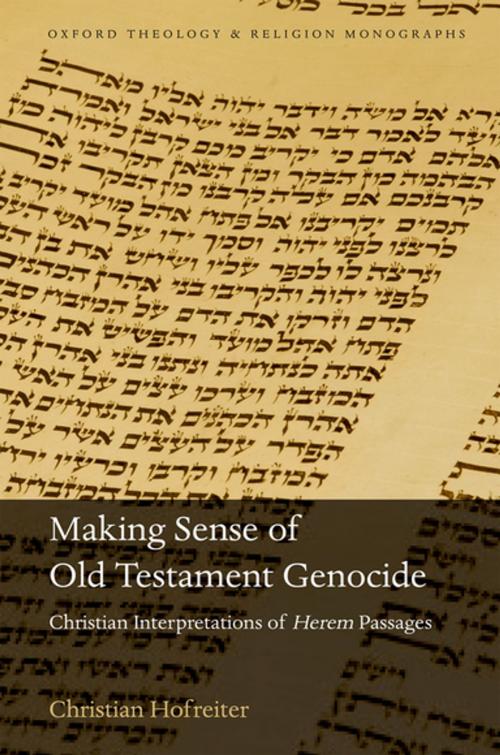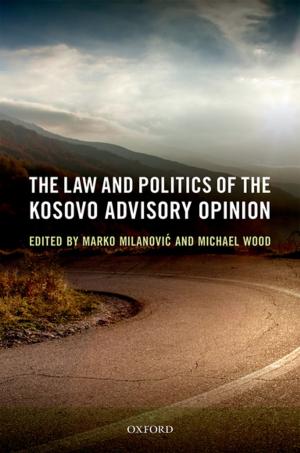Making Sense of Old Testament Genocide
Christian Interpretations of Herem Passages
Nonfiction, Religion & Spirituality, Bible & Bible Studies, Old Testament, Criticism & Interpretation| Author: | Christian Hofreiter | ISBN: | 9780192539014 |
| Publisher: | OUP Oxford | Publication: | February 23, 2018 |
| Imprint: | OUP Oxford | Language: | English |
| Author: | Christian Hofreiter |
| ISBN: | 9780192539014 |
| Publisher: | OUP Oxford |
| Publication: | February 23, 2018 |
| Imprint: | OUP Oxford |
| Language: | English |
The divine commands to annihilate the seven nations living in Canaan (to 'devote them to destruction', herem in Biblical Hebrew) are perhaps the most morally troubling texts of the Hebrew and Christian bibles. Making Sense of Old Testament Genocide: Christian Interpretations of Herem Passages addreses the challenges these texts pose. It presents the various ways in which interpreters from the first century to the twenty-first have attempted to make sense of them. The most troubling approach was no doubt to read them as divine sanction and inspiration for violence and war: the analysis of the use of herem texts in the crusades, the inquisition, and various colonial conquests illustrates this violent way of reading the texts, which has such alarming contemporary relevance. Three additional approaches can also be traced to antiquity, viz. pre-critical, non-literal, and divine-command-theory readings. Finally, critics of Christianity from antiquity via the Enlightenment to today have referenced herem texts: their critical voices are included as well. Christian Hofreiter combines a presentation of a wide range of historical sources with careful analysis that scrutinizes the arguments made and locates the texts in their wider contexts. Influential contributions of such well-known figures as Augustine, Origen, Gregory the Great, Thomas Aquinas, and John Calvin are included, as well as those of critics such as Marcion, Celsus and Matthew Tindal, and less widely known texts such as crusading histories, songs and sermons, colonial conquest accounts, and inquisition manuals. The book thus sheds new light on the ways in which these texts have shaped the thoughts and actions of their readers through the centuries, and offers pertinent insights into how readers might be able to make sense of them today.
The divine commands to annihilate the seven nations living in Canaan (to 'devote them to destruction', herem in Biblical Hebrew) are perhaps the most morally troubling texts of the Hebrew and Christian bibles. Making Sense of Old Testament Genocide: Christian Interpretations of Herem Passages addreses the challenges these texts pose. It presents the various ways in which interpreters from the first century to the twenty-first have attempted to make sense of them. The most troubling approach was no doubt to read them as divine sanction and inspiration for violence and war: the analysis of the use of herem texts in the crusades, the inquisition, and various colonial conquests illustrates this violent way of reading the texts, which has such alarming contemporary relevance. Three additional approaches can also be traced to antiquity, viz. pre-critical, non-literal, and divine-command-theory readings. Finally, critics of Christianity from antiquity via the Enlightenment to today have referenced herem texts: their critical voices are included as well. Christian Hofreiter combines a presentation of a wide range of historical sources with careful analysis that scrutinizes the arguments made and locates the texts in their wider contexts. Influential contributions of such well-known figures as Augustine, Origen, Gregory the Great, Thomas Aquinas, and John Calvin are included, as well as those of critics such as Marcion, Celsus and Matthew Tindal, and less widely known texts such as crusading histories, songs and sermons, colonial conquest accounts, and inquisition manuals. The book thus sheds new light on the ways in which these texts have shaped the thoughts and actions of their readers through the centuries, and offers pertinent insights into how readers might be able to make sense of them today.















